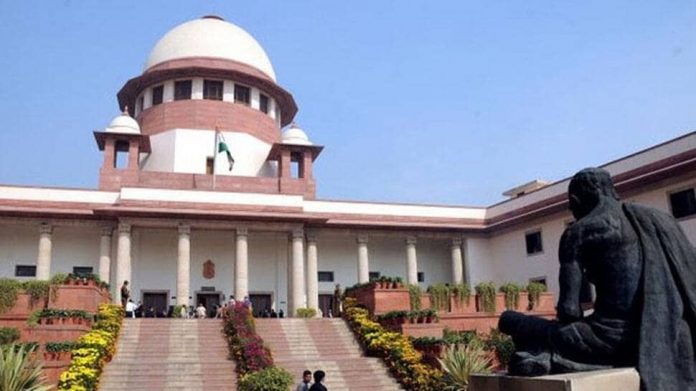Appellant, a law student, argues that parts of the act are violative of the Right to Privacy
A plea has been moved before the Supreme Court challenging few provisions of the Special Marriage Act for being violative of fundamental rights of the citizens.
The plea has been filed seeking directions to strike down of Sections 6 (2), 7, 8 and 10 of the Special Marriage Act, 1954 for being unjust, illegal and unconstitutional, and violative of Articles 14, 15 and 21 of the Indian Constitution.
Brief on the Special Marriage Act and impugned provisions: The Special Marriage Act, 1954 is an act enacted by Parliament with intent to provide a special form of marriage for the people of India and all Indian Nationals in foreign countries, irrespective of the religion or faith followed by either party.
Under the Act, Section 5 requires that a notice of the intended marriage be given to the marriage officer. When a marriage is intended to be solemnised under this Act, the parties of the marriage are required to give a notice in writing to the Marriage Officer of the district. The Marriage Officer then keeps the notice in the records of his office and keeps a copy of the notice in the Marriage Notice Book, which is open for inspection by anyone who wants to at all reasonable times and without any fee. The notice is also published by affixing a copy to some conspicuous place in his office.

Thirty days after such notice is published, the marriage may be solemnised unless an objection is received under Section 7. Section 7 provides a chance to any to object to the marriage on the ground that it would contravene one or more of the conditions required to be eligible to marry under the Act.
Under Section 8, the Marriage Officer will not solemnise the marriage until either he has inquired into the matter and is sure that there’s nothing to prevent the marriage or the objection is withdrawn by the person who made it.
Section 9 gives Marriage Officers all the powers vested in a Civil Court for the purpose of any inquiry into any objections received.
The plea: According to the petitioner, a law student, a very peculiar requirement of the Special Marriage Act is publishing of details of notice of marriage by the marriage officers including the details of the parties like names, date of birth, age, occupation, parents’ names and details, address, pin code, identity information, phone number etc. Therefore, Clauses (2) and (3) of Section 6 to the extent to which those direct to cause affixation of notice in some conspicuous place in the office of Marriage Officer are violative of the right to privacy of the parties to the marriage. Sections 7 to 8 and 10 of the SMA and Section 9 to the extent to which it deals with inquiry under Section 8 of the Act are also violative of the right to privacy of the parties to the marriage. These provisions are liable to be struck down.

The plea has stated that provisions of the Act allow anyone to submit objections to the marriage and empower the Marriage Officer to inquire into such objections, which is violative of the fundamental rights of couple intending to marry, depriving them of their right to privacy under Article 21 of the Constitution of India.
Talking about the requirement of notice, the petitioner has stated that such notice before marriage is not required under the Hindu Marriage Act, 1955 and customary laws in Islam. Therefore, the said provision is also discriminatory and violative of Article 14 of the Constitution of India,” avers the plea.
The plea has cited the judgment of Justice K. S. Puttaswamy v. Union of India (2017) where the Supreme Court had held that informational privacy needs to be protected as a facet of privacy right. The provisions of the Act however throw the personal information of the individuals open to public scrutiny, seriously damage one’s right to have control over her or his personal information and its accessibility. These provisions fail the three tier test, endorsed in K.S. Puttaswamy i.e. legality, legitimacy and proportionality, According to the petitioner, marriage reflects a private decision taken by two consenting adults and the Special Marriage Act was formulated to provide a secular form of marriage. By making the personal details of the couple accessible to everyone, the very right of the couple to be the decision makers of their marriage is being hampered by the State.
Debate around the Special Marriage Act:
The validity of some provisions of the Special Marriage act have been questioned and debated on numerous occasions in the past as well. Several cases have been reported by leading news handles, about couples who intended to marry under the SMA and had to face wrath of the society specially in cases of Inter-religion marriages. This has happened because their information was made public in concurrence with the provisions and requirements of the Special Marriage Act, leaving them vulnerable, and on the receiving end of communal hatred if they belonged to different religions. Its been reported that in various States the notices are also uploaded online apart from being affixed on the notice boards, thus making it easier to access and circulate the notice and harass the couple and the family involved.
Read Also: No evidence of charas addiction, Delhi HC grants bail to man
The Apex Court’s decision in 2017 to hold that Right to privacy was part of a person’s fundamental right had a major role to play in setting off new waves of discussions regarding the importance of a person’s privacy. With reference to the plea questioning provisions of the Special Marriage Act, it will be interesting to see how the Court responds to the possibility of misuse of personal information and the harm that it may cause.


